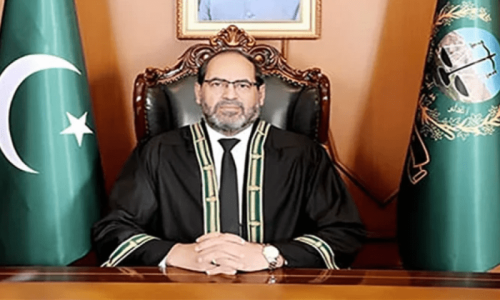BEFORE the mysterious circumstances in which Jamaatul Ahrar spokesperson Ehsanullah Ehsan came to be in custody of Pakistan’s security forces could be fully explained, a sensational new twist in the story has overtaken the previous unanswered questions. In what has now become a familiar and expertly produced mode of confession, portions of Ehsan’s videotaped confession have been made public by the ISPR and broadcast around the country. The self-confessed terrorist, who has claimed responsibility on behalf of the Jamaatul Ahrar for some of the worst militant attacks in Pakistan, has alleged that in recent years Afghan and Indian intelligence agencies have supported and financed the banned Tehreek-i-Taliban Pakistan and directed attacks inside Pakistan. The claim is neither new nor surprising and no serious observer of the region can believe it is without merit. The degree to which Afghan and Indian intelligence agencies may be supporting anti-Pakistan militants in their war against this country can be debated, but there is far too much circumstantial evidence, even without Ehsan’s allegations, to deny the link between Afghanistan, India and anti-Pakistan militants who have found sanctuary in Afghanistan.
What is troubling, however, is the centrality that the so-called foreign hand claims have been given in the portions of the confession that have been broadcast. It has the potential to undermine the hard-won recognition in recent years that the fight against militancy is a local fight against local enemies who subscribe to an ideology that was locally developed. After years of reluctance, the security establishment has been in recent times more willing to acknowledge past mistakes and recognise that the war Pakistan has been plunged in is against militant networks that were once patronised by the state itself. Indeed, in former army chief Gen Raheel Sharif’s and current army chief Gen Qamar Bajwa’s unequivocal statements that both Pakistan and Afghanistan suffer from terrorism and that Pakistan will not tolerate militancy and terrorism of any stripe or hue, hopes were raised that a regional approach to fighting religiously inspired militancy with common ideological roots would take shape. Pakistan should emphatically press its case with Afghanistan and India that support for anti-Pakistan militancy will not be tolerated. What the country’s leadership must not do is create fresh confusion about who the real enemy is and thereby inadvertently create some sympathy for the Pakistani Taliban as misguided and manipulated fighters.
As for Ehsanullah Ehsan, he must face justice. In no circumstances should an individual who brashly and with a great deal of pride claimed responsibility for the slaughter of countless Pakistanis ever be allowed to escape punishment. There are no conceivable circumstances, no tactical gains or operational information that Ehsan can offer to justify ever being a free man again.
Published in Dawn, April 28th, 2017











































